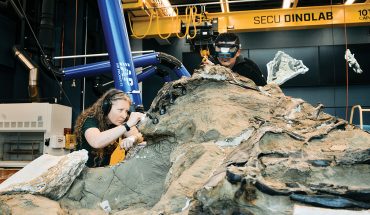The Harvard 100
by Jessie Ammons Rumbley
Chuck ReCorr has spent almost five decades crunching numbers to maximize outcomes: He leads a team of wealth managers at Bank of America Merrill Lynch who oversee investments for high-net-worth clients. Meanwhile, since 2011, ReCorr has also quietly been investing in Raleigh’s nonprofit community: This month, he will have sent 100 nonprofit leaders and board members to social enterprise courses at Harvard Business School. “The premise is that we need to reward human capital,” ReCorr says. “I can give you $5,000 and it will, say, send 10 kids to camp. Or I can send your executive director to Harvard and they will figure out how to send 50 kids to camp, or 100 kids, or 200 kids. What I’m hoping to emphasize through this exercise is that human capital is the most important asset we have in the community.”
Along the way, these movers and shakers, advocates for diverse causes, have connected over a shared common education. They’ve tapped into each other’s resources and together forged a stronger local nonprofit network. “No other philanthropist has done this,” says Jackie Craig, executive director of The Green Chair Project, which reuses donated home furnishings to benefit those recovering from homelessness or crisis. Craig is a May 2017 graduate of the four-day course. “It’s remarkable. … As executive directors, to be lifted out of our day-to-day and be encouraged and informed at such a high level, is life changing. It really was a game-changer, in my life of leading a nonprofit.”
The matrix
ReCorr chose Harvard because it offers social enterprise courses that emphasize strategic thinking. “The big takeaway is: You have to focus on outcomes not outputs. Outputs are things you do, outcomes are the things you finally effect,” he says. In essence, leaders are encouraged to take time out of their daily grind to set concrete mission-driven goals, and then focus on reaching them – for example, a hunger relief organization might aim to feed a certain number of people in a year (a measurable reflection of hunger relief), rather than, at the end of the year, reflect on pounds of food distributed (to an unknown number of people, from which it’s harder to assess hunger relief). This thinking resonated with ReCorr as a way to effect sweeping community-wide change. He also chose Harvard because it’s in Massachusetts. “You cannot really effectively engage people by letting them go home at night, where they work,” he says. “You have to change their environment to where they’ll be totally focused on learning.”
Rather than start a foundation or organization of his own, this is the way ReCorr wants to give back. He issues five to 10 couple-thousand-dollar grants, the amount of a four-day course through Harvard Business School’s executive education program, from a donor fund at the Triangle Community Foundation. He does this twice a year, in the spring when a course geared toward executive directors takes place, and in the fall when a course geared toward board leaders takes place. Before each course, as many local alumni as possible gather together with ReCorr for a short program and to meet and mingle and offer advice to those about to go to Cambridge, Massachusetts. Alumni include both on-staff directors and volunteer board directors from Marbles Kids Museum, SAFEchild, Food Bank of Central and Eastern North Carolina, Transitions LifeCare, YMCA, StepUp Ministry, CAM Raleigh, and Band Together, to name a few.
Reaching the 100 milestone means he can consider this “experiment,” as ReCorr calls it, a success – there’s value in professionally empowering nonprofit leaders. “Early on, I picked a number. 100 is a good round number, and I wanted to see what would happen.” Had it not been working, he would have stopped far sooner than 100, he says; this marks enough momentum to hopefully spark community change. “Let me be clear: this is not about me. If my name never showed up on this it would not bother me one bit whatsoever. … This has to be a community-driven strategy, not an individually driven strategy. If it’s going to have any sustainability, it can’t be Chuck ReCorr.”
Uplifting leaders
So far, many of the local alumni seem to have learned exactly what ReCorr first liked about Harvard’s approach: strategic thinking for larger, mission-driven impact. By now, Harvard Business School counts on a Raleigh contingency in each of the two courses. “They call us out,” Craig of The Green Chair Project says. She says she can confidently speak for a handful of her peers – both actual classmates and others among the Harvard 100 group – about what the four-day course experience was like. Many expect, she says, to learn best practices and network with nonprofits across the country; in reality, they’re taught in the traditional Harvard Business School model, based on critical assessment of case studies, and they’re told the “outcomes over outputs” maxim.
“It’s uplifting to be taught at that (high) level,” Craig says. “I realized the importance of applying business skills to what we do. … Because, while we’re serving specific causes, we’re also all running business models, and often ones that rely on donations. That is not to be managed lightly.”
Alumni are also considering how to best make local cultural impact, heeding the outcome-focused Harvard approach. One of the first course-takers was ArtSpace President and CEO Mary Poole, who attended the school in May 2012. Now, she can tangibly reflect on how her lessons impacted the organization. “That was a pivotal time for us. We were starting to think about reassessing our mission and vision and impact and relevance in the community. (My time at Harvard) helped jump-start a much bigger movement that is even still happening today.” Since then, the visual arts center and artists’ studio space has significantly renovated its building to be more exhibition and education friendly, reflecting its focus on engaging the community alongside fostering member artists. “My experience strengthened the organization by challenging us to think about the work that we’re doing in the community, the impact that we’re having, and how we measure that.”
Paying it forward
Perhaps most importantly, the Harvard-goers feel encouraged to work in what can be a thankless sector. “I realized that the work many of us do here in Raleigh is just as important as what some of my Harvard classmates were doing in Africa,” Craig says. “We each fill such unique gaps in our communities and in our world.”
The biannual gatherings foster this realization and strengthen local resources. “I’ve said to them, I want to invest in you personally. You’re a great leader and I want you to be a phenomenal leader. That’s a different message,” ReCorr says, than other kinds of monetary support. And the value doesn’t end at Harvard; many leaders and board members meet separately in small groups regularly. “Continuing to grow the network of folks that you can reach out to and kick ideas around has been invaluable,” Poole says. “That 2012 experience has continued, and does continue, to feed our work.”
While ReCorr may not continue to issue tuition grants now that he’s given 100 (he won’t say either way), he hopes organizations will budget to send their own staff, he says. And he remains focused on his investment: the people behind the projects. He is an always-accessible mentor, quick to help a director re-focus on the end goal and push him or her toward excellence. “Human capital is infinitely more important, immediately, than brick-and-mortar programs, because human capital is what makes the rest of it happen. … If we can get organizations to talk to each other and work with each other, we win.”
About five years ago, when past board chair at Food Bank of Central and Eastern North Carolina Dana Lange returned from the course, she put together a slideshow of what she learned, ReCorr says, and met with dozens of Triangle nonprofits to share her takeaways. Right now, a group of graduates is working to create a digitally shared Triangle-wide nonprofit calendar, where organizations can cross-reference what gala or fundraiser or event happens when. This latest initiative is evidence of tremendous organization, and buy-in from a variety of key players. Says Craig: “What a unique community this makes us to have this group of equipped leaders.”




